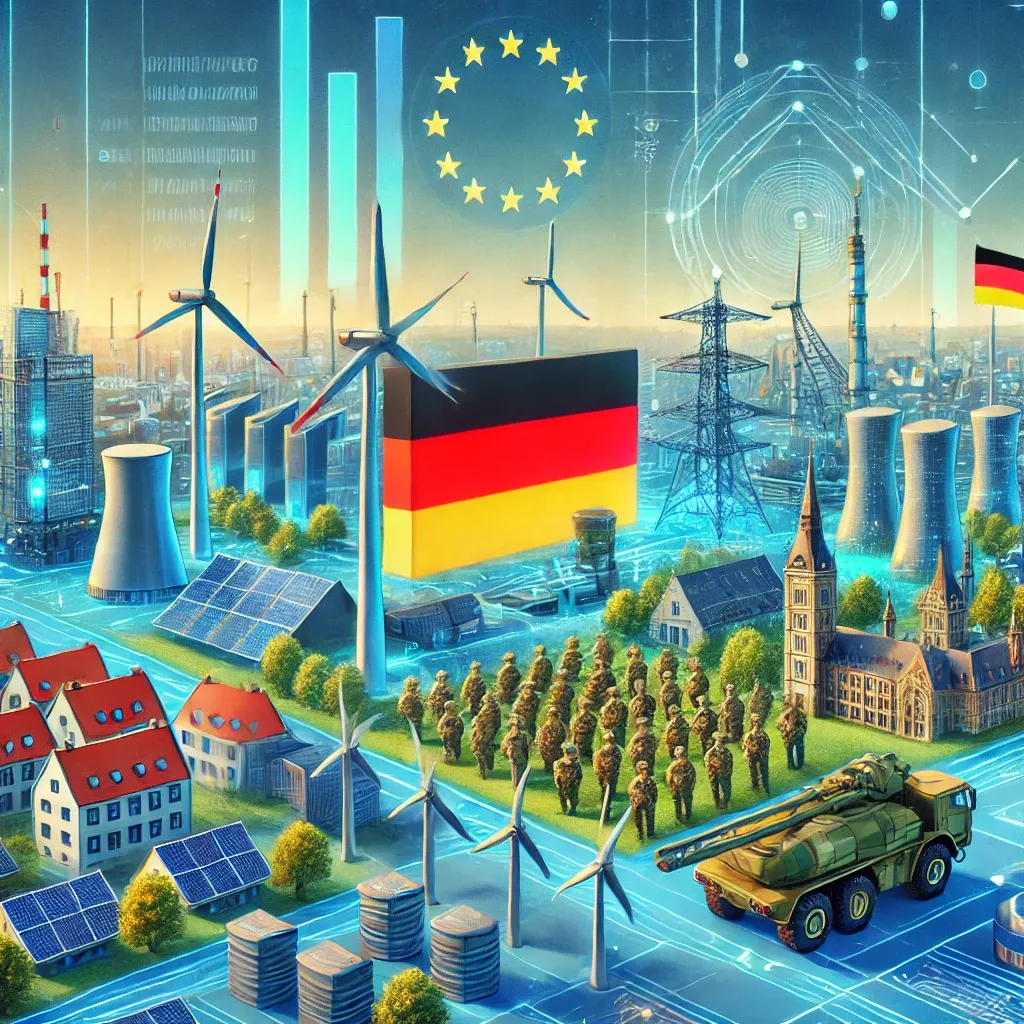
Vancouver, BC - March 22, 2025 - Germany has succeeded in enacting a significant fiscal reform, finally lifting its long-standing “debt brake” to increase defense spending and invest in infrastructure and climate protection. This historic change, approved by the Bundestag on March 18, 2025, will now allow borrowing beyond the previous cap of 0.35% of GDP, making it the largest fiscal shift since German reunification in 1990.
Increased Defense and Infrastructure Spending
The reform removes the restriction that limited defense spending to 1% of GDP, enabling Germany to bolster its military capabilities amid growing geopolitical tensions. Additionally, it establishes a €500 billion (approximately $544 billion) fund for infrastructure projects over 12 years, with €100 billion dedicated to climate-related initiatives. This investment aims to modernize transport, energy, education, and digital infrastructure.
Paragraph 3 of Article 109 of the Basic Law states that "the budgets of the Federation and the Länder shall, in principle, be balanced without revenue from credits." This means that the government may only spend as much money as it takes in, primarily from taxes and levies. This requirement is known as the "debt brake." The requirement was introduced during the 2009 global financial crisis under Chancellor Angela Merkel, of the Christian Democrats (CDU), and Finance Minister Peer Steinbrück of the Social Democrats (SPD).
EU Strengthening Defense Capabilities
Germany’s decision aligns with the European Union’s broader strategy to enhance military readiness. The EU’s "ReArm Europe" plan, proposed on March 4, 2025, aims to mobilize nearly €800 billion ($840 billion) for defense spending in response to Russia’s ongoing war in Ukraine and the diminishing U.S. support under President Donald Trump. This initiative involves relaxing EU fiscal rules to permit increased military budgets, augmented by loans and private investment.
In some ways, the market seems to embrace the idea of rearmament in Europe due to the potential for substantial profits. Shares in defense manufacturer Rheinmetall (DE: RHM) have surged by over 50 percent in just a month, as investors anticipate that Germany and other European nations will need to increase defence expenditures as the U.S. reduces its military presence. In other ways, significant challenges remain, as the current state of the armed forces raises concerns about operational readiness and the ability to reverse 30 years of neglect. The awkward question persists: Is there time to address these shortcomings effectively and is it worth it?
Conflicting Messages
The shifting sentiments in German political discourse regarding war, particularly in relation to the Ukraine conflict, highlight a profound transformation in attitudes that reflects both historical lessons and contemporary geopolitical realities. The phrase "never again" carries a dual significance in German society—never again should the world witness the atrocities of the Holocaust, and never again should Germany be drawn into destructive warfare. However, as new threats emerge, many argue that preventing another large-scale atrocity may, paradoxically, require military action.
Germany’s historical commitment to pacifism is now being reevaluated in light of the necessity of defending democratic values and human rights. The debate over military engagement reflects this tension, as policymakers navigate the fine line between upholding peace and ensuring that history does not repeat itself in a different form.
What This Means for Canada
Canada and Germany share a strong historical relationship, particularly in defense and diplomatic collaboration. With Germany and the EU prioritizing military investment, Canada is looking for opportunities to work alongside European allies to support Ukraine and strengthen collective security. This shift could lead to increased cooperation in defense manufacturing, intelligence sharing, and strategic military initiatives. Canada, under the new Prime Minister Mark Carney, has already been taking part in discussions around a coalition of countries which could contribute to a peacekeeping force in Ukraine, amid tensions between Ottawa and Washington DC.
The Road Ahead: An Uncertain Future
Germany’s debt will allow it to meet contemporary challenges while shaping the future of both European and international defence collaborations. Currently, Germany faces an urgent need to address its sluggish economy, underfunded defence forces, and aging infrastructure—evidenced by a third of the country’s trains running late— while an official report on the state of the German military points out that 28% of positions among the lower enlisted ranks are unfilled.
Many young people today do not consider military service a viable career path. Compulsory conscription was abolished in 2011 and is widely seen as impractical in today’s modern workforce. Defence Commissioner Eva Högl has proposed a new form of national service for the incoming parliament to consider. Under Högl's vision, both young men and women would be required to complete a “social year,” with options ranging from military service to roles in disaster relief or other civil service sectors. Yet this still would not fulfill all the positions the German military needs.
While we all recognize the need to change the status quo, implementing these changes will be an uphill battle in Germany and other countries. The timeline for achieving these goals remains uncertain, and with the fall out of major elections in the U.S., Canada, and Germany, the political landscape has undergone a domino effect, as each incoming leader is making decisions that has knocked over the existing frameworks and approaches to foreign policy of the other. By staying engaged and supporting diplomatic efforts, we can work towards a resolution that seeks to avert conflict and at the same time provides adequate support to our allies & friends.
#Germany Debt Reform #EU Defence #German Economy #Military Spending #Infrastructure Investment #Climate Action #Global Security #Canada EU Alliance #WBN News Vancouver #Elke Porter
Connect with Elke at Westcoast German Media or on LinkedIn: Elke Porter or contact her on WhatsApp/Text: +1 604 828 8788. Call me for PR or Advertising Services.
